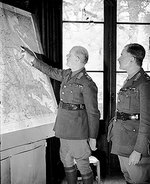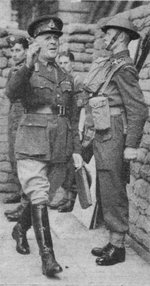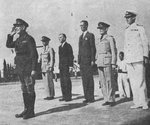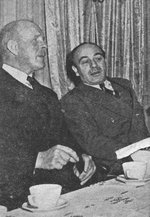John Vereker
| Surname | Vereker |
| Given Name | John |
| Born | 10 Jul 1886 |
| Died | 31 Mar 1946 |
| Country | United Kingdom, Ireland |
| Category | Government |
| Gender | Male |
Contributor: C. Peter Chen
ww2dbaseJohn Standish Surtees Prendergast Vereker was born in London, England, United Kingdom into the Anglo-Irish aristocratic Vereker family. He spent many of his childhood years in County Durham in northern England and the Isle of Wight off southern England. He attended Malvern Link Preparatory School and Harrow School before enrolling in the Royal Military Academy, Woolwich, in Jan 1904. Prior to Woolwich, he succeeded his father as the 6th Viscount Gort (Peerage of Ireland). He graduated from the military academy in 1905 and was commissioned in the Grenadier Guards in Jul of that year. In 1910, at the rank of lieutenant, he commanded the non-commissioned officers who served in the role of pall-bearers to the deceased King Edward VII. On 22 Feb 1911, he married Corinna Vereker, a second cousin, at the Guards Chapel, Wellington Barracks, London; they would later have three children between 1912 and 1914. He was promoted to the rank of captain in Aug 1914. During WW1, he served with the war time rank of brevet major and acting lieutenant colonel on the Western Front, winning the Distinguished Service Order in Jun 1917 and bars to the DSO in Sep 1917 and Jan 1919. In Sep 1918, at the Battle of Canal du Nord in France, he personally led his men to advance under heavy fire despite being wounded, which led to the capture of over 200 enemy prisoners of war; for this, he was awarded the Victoria Cross on 27 Nov 1918. In Nov 1919, he was promoted to the permanent rank of major; in the same year, he completed a course at the Staff College in Camberley, Surrey, England. Between 1921 and May 1923, he was an instructor at the Staff College, during which time he became a sailer and joined the Royal Yacht Squadron in 1922. In 1924, he rewrote the Infantry training manual. In 1925, Lord Gort and Corinna Vereker divorced. In Apr 1926, he was promoted to the rank of colonel. In Jan 1927, he visited Shanghai, China, returning in Aug to provide his personal analysis to King George V and the Prince of Wales (future King Edward VIII). In Jun 1928, he was made a Commander of the Order of the British Empire. In 1930, he became the commander of the Guards Brigade. In 1932, he learned how to fly, and later becoming the chairman of the Household Brigade Flying Club. In Nov 1935, he was promoted to the rank of major general. In 1936, he was named the commandant of the Staff College. In May 1937, he was made a Companion of the Bath. In Sep 1937, he became the Military Secretary to the War Minister Leslie Hore-Belisha at the temporary rank of lieutenant general. In Dec 1937, he was made a general, appointed to the Army Council, and appointed the Chief of the Imperial General Staff. On the first day of 1938, he was made a Knight Commander of the Order of the Bath. Just prior to the start of the European War, he advocated the strengthening of the British Army so that it could assist France in the defense of the Low Countries, if necessary, in the face of potential German aggression.
ww2dbaseAfter the European War began in Sep 1939, he was given command of the British Expeditionary Force in France. When Germany invaded France and the Low Countries, his troops were ultimately unable to stop the invasion, and on 25 May 1940 he ordered all offensives to cease so that preparations for evacuation could begin. Although he was credited for saving the bulk of the British Expeditionary Force from destruction, he also bore the shame of the defeat in France especially given the fact that he failed to launch any major counter-offensives. Upon his return to Britain, he served as the aide-de-camp to King George VI, Inspector of Training, held command of the Home Guard, Governor of Gibraltar (1941-1942), and Governor of Malta (1942-1944). In Jun 1943, he was made a field marshal, and he received the field marshal's baton from King George VI at Malta.
ww2dbaseIn Nov 1944, Lord Gort became the High Commissioner for the British Mandate of Palestine. After the war, during a meeting with Field Marshals Alan Brooke and Bernard Montgomery, he collapsed. At the hospital, he was diagnosed with cancer. In Feb 1946, he was made Viscount Gort in the Peerage of the United Kingdom. He passed away in Mar 1946. His Irish Viscountcy of Gort was passed to his brother, while his British Viscountcy became extinct.
ww2dbaseSource: Wikipedia
Last Major Revision: Sep 2011
John Vereker Interactive Map
Photographs
 |  |  |  |
John Vereker Timeline
| 10 Jul 1886 | John Vereker was born in London, England, United Kingdom. |
| 22 Feb 1911 | Lord Gort married Corinna Vereker at the Guards Chapel, Wellington Barracks, London, England, United Kingdom. |
| 3 Sep 1913 | Lord Gort was appointed the aide-de-camp to General Officer Commanding London District Francis Lloyd. |
| 27 Sep 1918 | At the Battle of Canal du Nord in France, Lord Gort led his men to advance under heavy fire despite being wounded. He would later win the Victoria Cross. |
| 27 Nov 1918 | Lord Gort was awarded the Victoria Cross for gallantry exhibited at the Battle of Canal du Nord in France on 27 Sep 1918. |
| 6 Dec 1937 | Lord Gort was made a general, appointed to the Army Council, and appointed the Chief of the Imperial General Staff. |
| 1 Jan 1938 | Lord Gort was made a Knight Commander of the Order of the Bath. |
| 2 Dec 1938 | Lord Gort submitted a report noting that the German military had improved in its fighting qualities over the past year, especially since the annexation of Czechoslovakia, while the British Army fighting strength had been weakened due to political decisions made in 1937. |
| 21 Dec 1938 | Lord Gort recommended the British Chiefs of Staff that the United Kingdom must assist France in the defense of the Low Countries should they be challenged by Germany. To achieve this, he advocated the improvement of British infantry and armored divisions. |
| 19 Sep 1939 | Commander of the British Expeditionary Force Lord Gort arrived in France. |
| 11 Apr 1940 | In a report to the War Office in London, British General Lord Gort of Limerick, VC, stated that his five regular-army divisions were effective, although not up to the standards of the British Expeditionary Force of 1914. The remaining eight Territorial divisions, he reported were, fit only for static warfare. |
| 1 Jun 1940 | Lord Gort was made the aide-de-camp to King George VI. |
| 25 Jun 1940 | Lord Gort departed Britain by flying boat for Rabat, French Morocco to speak with French ministers; political situations would prevent him from successfully meeting with the French. |
| 26 Apr 1941 | General Lord Gort was appointed Governor and Commander-in-Chief of Gibraltar. |
| 14 May 1941 | Lord Gort was appointed the Governor of Gibraltar. |
| 7 May 1942 | General Lord Gort flew into Malta and was appointed Governor and Commander-in-Chief of Malta in succession to Lieutenant-General Sir William Dobbie. He landed two days before the arrival of the Spitfire V aircraft being brought on the aircraft carriers HMS Eagle and USS Wasp. His first two orders were to employ the Army to assist with servicing the Spitfire aircraft when they arrive and the creation of a smoke screen over the Grand Harbour. He also announced the King's award of the George Cross to the islanders. |
| 31 May 1942 | Lord Gort stepped down as the Governor of Gibraltar. |
| 1 Jan 1943 | Lord Gort was promoted to the rank of field marshal. |
| 20 Jun 1943 | Lord Gort received the field marshal's baton from King George VI at Malta. |
| 29 Sep 1943 | Lord Gort participated in the Italian surrender ceremony in Valetta harbor in Italy. |
| 26 Sep 1944 | Lord Gort stepped down as the Governor of Malta. |
| 1 Nov 1944 | Lord Gort was appointed the High Commissioner of the British Mandate of Palestine. |
| 5 Nov 1945 | Lord Gort stepped down as the High Commissioner of the British Mandate of Palestine. |
| 31 Mar 1946 | Lord Gort passed away. |
Did you enjoy this article or find this article helpful? If so, please consider supporting us on Patreon. Even $1 per month will go a long way! Thank you. Share this article with your friends: Stay updated with WW2DB: |
Visitor Submitted Comments
All visitor submitted comments are opinions of those making the submissions and do not reflect views of WW2DB.
» Invasion of France and the Low Countries
» Malta Campaign
» Invasion of Sicily and Italy's Surrender
- » 1,150 biographies
- » 337 events
- » 43,917 timeline entries
- » 1,241 ships
- » 350 aircraft models
- » 207 vehicle models
- » 374 weapon models
- » 123 historical documents
- » 260 facilities
- » 470 book reviews
- » 28,540 photos
- » 432 maps
Winston Churchill
Please consider supporting us on Patreon. Even $1 a month will go a long way. Thank you!
Or, please support us by purchasing some WW2DB merchandise at TeeSpring, Thank you!
11 May 2020 02:35:01 AM
I have often visited the church at Penshurst Place and the chapel and seen his tablet never knowing what a truly amazing man Lord Gort was. I am grateful he was on our side during the both first and second world wars. An incredible man !!!